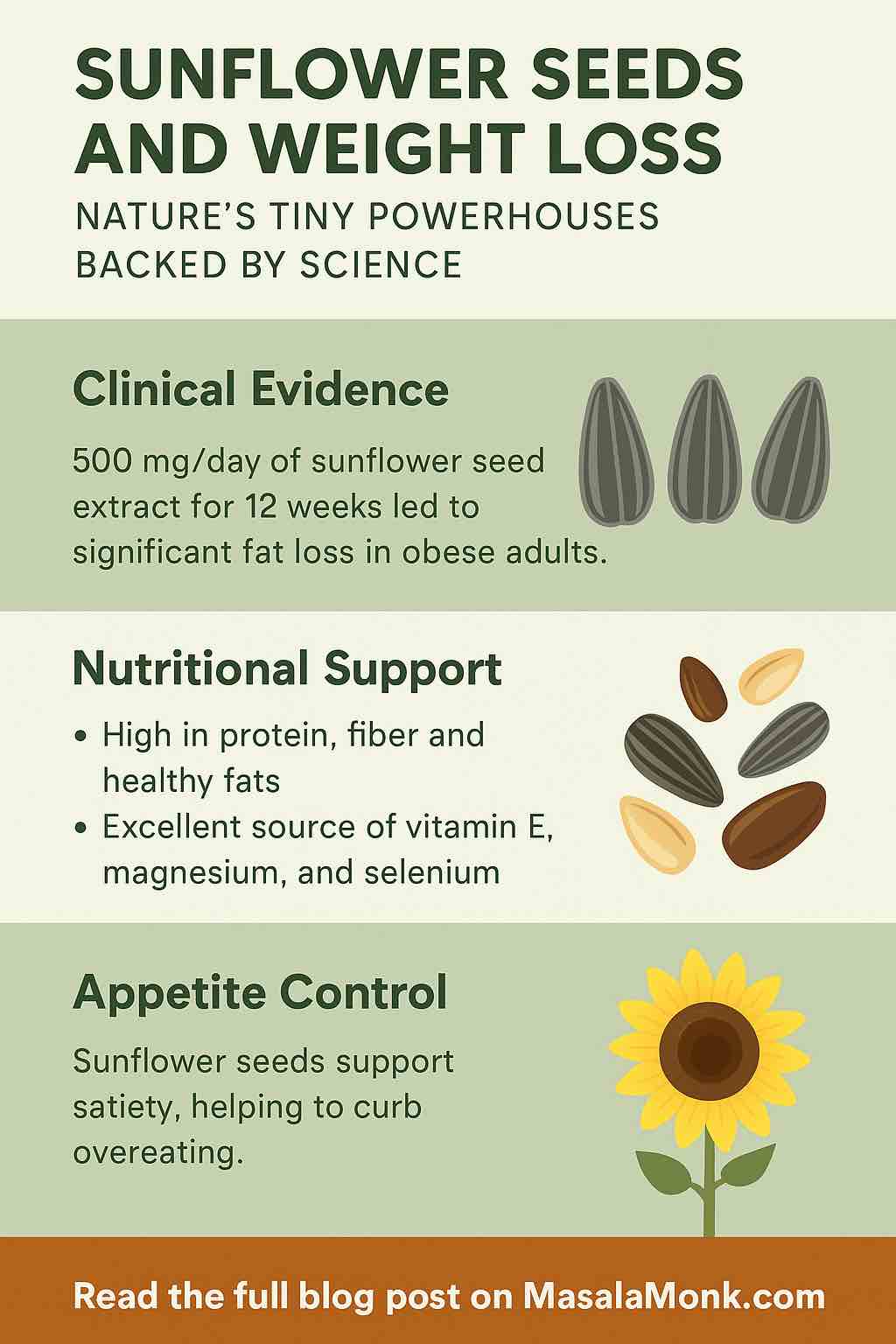
When it comes to weight loss, it’s easy to get overwhelmed with fads, restrictive diets, or supplements that promise quick results. But what if one of the most effective tools was a humble seed you’ve likely walked past in the grocery aisle countless times? Welcome to the world of sunflower seeds — a crunchy, satisfying, and scientifically supported ally in your weight loss journey.
This isn’t just nutrition hype. Recent clinical trials and in-depth mechanistic studies show that sunflower seeds and their extracts, particularly those rich in chlorogenic acids (CGAs), deliver real metabolic and fat-loss benefits. Let’s dig deep and explore the practical and evidence-based reasons why these seeds deserve a spot in your daily routine.
1. Backed by Science: Real-World Trials on Fat Loss
Latest 2023 Clinical Trial
A double-blind, randomized, placebo-controlled trial (Nutr Res, Dec 2023) explored the effects of 500 mg/day of sunflower seed extract standardized to ~100 mg CGAs. Conducted on 100 obese adults over 12 weeks:
- Body fat reduced by -0.9 kg, compared to -0.1 kg in the placebo group
- BMI, weight, and hip circumference all improved significantly
- Zero adverse effects, confirming it’s safe and well-tolerated
2019 Pilot Study: Stronger in Women Over 30
Another 12-week pilot RCT on 50 obese adults found:
- BMI dropped by 2.6 points
- Waist circumference shrank by 8.4 cm
- Fat mass loss without compromising lean muscle
- Best results were seen in women aged 30+, who lost ~7.7% of body weight
The common thread? Both used 500 mg/day sunflower extract rich in CGAs — the real active compound behind the metabolic shift.
2. How It Works: The Science of Chlorogenic Acids (CGAs)
CGAs are powerful plant compounds found in sunflower seeds that:
- Regulate glucose absorption in the gut
- Enhance insulin sensitivity, helping your body store less fat
- Reduce inflammation, which is tightly linked to obesity
- Stimulate fat oxidation, promoting the use of fat as fuel
These effects together create a more stable metabolic environment, reduce cravings, and support long-term fat reduction.
3. Whole Seeds Still Matter: Nutritional & Satiety Support
Even if you don’t use concentrated extracts, whole sunflower seeds are:
- High in protein (~5-6g per ounce)
- Rich in fiber (~2-3g per ounce)
- Packed with healthy fats, especially polyunsaturated fats
- A source of magnesium, selenium, and vitamin E
This combo helps stabilize blood sugar, reduce hunger, and fight inflammation — all critical for weight control.
Practical Use Tips
- Keep daily portions to 1 ounce (about 2 tablespoons)
- Use them as toppings on salads, yogurt, or oatmeal
- Choose dry-roasted, unsalted versions to limit sodium
- Consider sunflower seed butter (unsweetened) as a satisfying snack
4. Real Talk: Seeds vs. Extracts
| Feature | Whole Seeds | Extract (SUN-CA, etc.) |
|---|---|---|
| Fat Loss Evidence | Indirect support | Strong RCT-backed evidence |
| Satiety | High | Moderate |
| Micronutrient Richness | Yes | No |
| Ease of Use | Snackable | Supplement capsule |
For daily support and snack satisfaction, go for the seeds. For targeted fat-loss intervention backed by trials, the extract is the clear winner.
5. Final Thoughts: Build a Sustainable, Science-Backed Routine
Sunflower seeds won’t magically melt fat overnight, but they do work when used smartly:
- Include 1 serving of whole seeds daily for satiety and nutrient support
- Add a standardized extract supplement (500 mg/day) if you’re targeting fat loss directly
- Pair with a balanced diet and moderate exercise for sustainable, long-term results
Remember: weight loss is not about hacks; it’s about consistency and informed choices. And sunflower seeds — tiny as they are — offer both power and proof.
FAQs
1. Can sunflower seeds really help with weight loss?
Yes, both clinical trials and nutritional science support their benefits. Sunflower seed extracts (especially standardized for CGAs) have shown measurable fat loss, while whole seeds support satiety and stable blood sugar.
2. What is the recommended dosage of sunflower seed extract for weight loss?
500 mg/day of standardized extract (typically containing 100–200 mg of chlorogenic acids) taken for 12 weeks has shown statistically significant fat loss results.
3. How many sunflower seeds should I eat per day for health benefits?
Stick to 1 ounce per day (about 2 tablespoons). This offers protein, fiber, healthy fats, and key micronutrients without excessive calories.
4. Do sunflower seeds reduce belly fat specifically?
They help reduce overall body fat and waist/hip circumference, as seen in clinical trials. While spot reduction isn’t possible, they contribute to healthier fat distribution.
5. Is sunflower seed butter as effective as whole seeds?
Unsweetened sunflower seed butter can offer similar nutrient benefits, but watch for added sugars or oils. Stick to 1–2 tablespoons per day.
6. Can I take sunflower extract and still eat sunflower seeds?
Yes. They serve different roles: the extract targets metabolic processes, while seeds support satiety and nutrient intake. Just keep track of total fat and calorie intake.
7. Are there any side effects from sunflower seed extract?
In clinical studies, sunflower seed extract was safe and well-tolerated with no significant side effects. Always choose reputable brands and consult your healthcare provider.
8. When should I take sunflower seed extract?
It can be taken once daily, preferably with a meal to aid absorption. There is no strict time, but consistency matters.
9. Are sunflower seeds suitable for keto or low-carb diets?
Yes. They are low in net carbs, high in fat, and rich in fiber—making them an excellent snack for keto and low-carb lifestyles.
10. Can I roast sunflower seeds at home without losing nutrients?
Yes, lightly dry-roasting at low heat retains most nutrients. Avoid oil-roasted versions to keep calories and unhealthy fats low.









